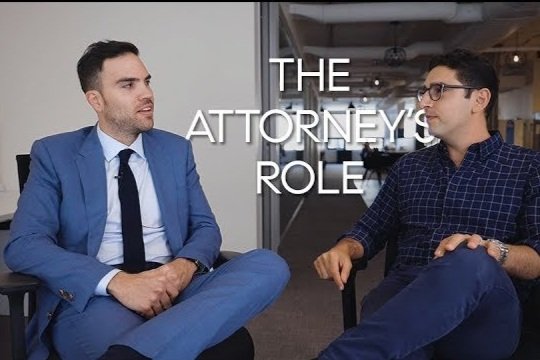We always emphasize the importance of having an experienced team behind you during the home buying process. An attorney is no exception. A real estate attorney may be one of the most important – and necessary – investments for a homebuyer.
Attorneys work to guide you through the complex process of transferring legal documents from one entity to another. Needless to say, they get into the nitty-gritty of things. So what exactly do attorneys do for you? Sam Korshak is here to give us an idea of an attorney’s role in a transaction.
So what is the attorney’s responsibility in a transaction?
My responsibility is to review the contract, look at all the terms, check all the dates. The biggest issue is, I’m watching the dates to make sure that the buyer never loses their earnest money.
With a fully executed contract, the first step is, we tender earnest money. Once complete, the attorney review period begins. Do you want to first share what earnest money is?
So earnest money is just a contractually agreed upon amount of money the parties deposit with the listing. It’s to say. “Hey, I’m going to act in good faith and move forward in this contract”. The first amount of earnest money is normally a very small amount, usually about a thousand dollars.
The second is a more substantial deposit and it’s another good faith gesture to the seller. Saying, “I now have sealed up the contract. The contract is fully negotiated and now I am going to diligently apply for my mortgage”. And the greatest part about this is – God forbid, the buyer does not get the mortgage – there’s a contingency built into the contract that allows them to get their entire earnest money deposit back.
Can you tell us broadly what attorney review is and what your specific role is?
Ultimately, what I would do is solidify the contract. What’s interesting is, once you sign a contract, even though it’s signed by the buyer and the seller, the contract is actually contingent. Once your attorney approves or modifies the contract in a way that’s more favorable for each of their clients, that is when it’s solidified. So in a sense, there’s really no hard contract or hard deadlines that have to be met until both parties agree to the new version of the contract.
What you’re trying to say is the contract that I put together is not fully enforceable until you have your eyes on it, and it gets your seal of approval followed by our clients’ seal of approval?
Absolutely. Once you sign this contract, there’s actually a lot of different ways that you can get out.
The first way is I say, I don’t like the contract. You can cancel it within five business days and actually we can cancel it usually beyond five business days until the time both sides make some sort of agreement.
In addition to attorney review, if we don’t like what the inspection report discloses, I can terminate the contract for the client.
The next one is buying into a condominium. When you buy a condo, you’re buying into a business. You might sit on the board, maybe you’re going to start paying assessments. We want to make sure that you’re buying into a financially sound business. So if we don’t like what we see in the condo docs, when we take a deep look into it, we can get you out that way. When I say “get you out” I’m saying I can get your earnest money back each time.
The last and most important contingency that we can find in the contract is your mortgage contingency. If you don’t get your mortgage on time, or if you don’t qualify for your mortgage, I can get you all your earnest money back. So that’s why it’s really important to have an attorney review and to also have an attorney look at the contract because we will really watch your back.
So a big part of attorney review is the inspection report. What’s your role during the inspection?
Generally I will take a look at the inspection report. I will discuss it with the client and agent. Normally we will come up with a number we can either request that the seller make the repairs that we find are major defects or we can request that the seller provide closing cost credit.
I normally suggest that my client ask for closing cost credit, because most of the time, a seller’s idea of something being repaired doesn’t necessarily match up with the buyer’s idea of what is a good repair.
What’s your role during closing?
When you actually sit down at the closing table, I’m looking through each document with you and I’m explaining to you exactly what it is that you’re signing. I’m going to look through all of your numbers prior to closing, to make sure that you’re not overpaying or paying junk fees. And I’m going to make sure that the tax probation or the credit that you receive in order to pay taxes that you’re going to assume from the seller is adequate.
So it’s very important to have somebody look these numbers over and monitor them because otherwise they could be wrong. The title insurance company doesn’t really care about you. They are not going to check to make sure that it’s okay and neither is the seller’s attorney.
Hopefully there’s no issues. There’s no arguments at the closing table. And in that sense, a boring closing table is a good thing.

